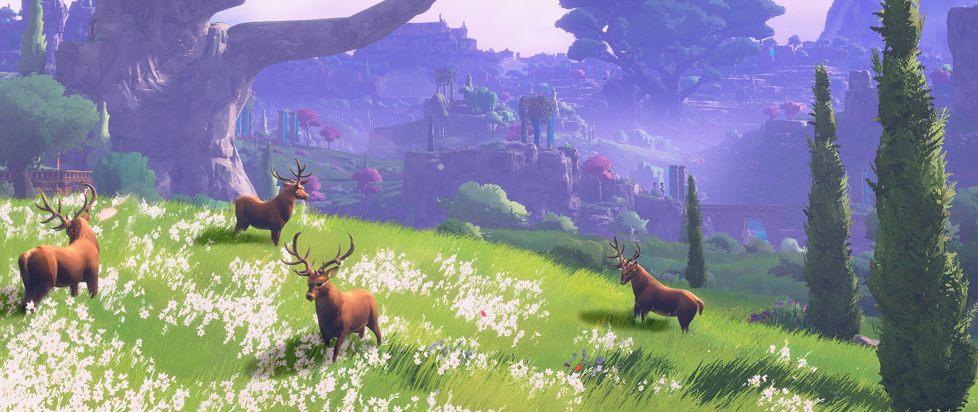
Immortals Fenyx Rising: Interview with Jeffrey Yohalem
Ubisoft will finally release its newest IP, the previously-delayed Greek mythological adventure Immortals Fenyx Rising, on December 3rd. According to the game’s narrative director Jeffrey Yohalem, the delay may have proved fortuitous and its release date could not have been better-planned.
“I’m actually really thrilled by the release date,” Yohalem explained, “because on a lot of levels [Immortals] is a Christmas story.” The game’s December release is perfect then, because not only is Ubisoft Quebec’s new game an escapist bit of comedy, it also has that Christmas shine to it.
“It’s a story about someone who made a lot of mistakes, and the question is whether that person should be unforgivable,” Yohalem explained. “It’s a question that gets asked in some Christmas stories, and is also a very modern question.”
Ancient Greeks took their entertainment seriously—these people invented theatres, after all—and Greek dramas served to investigate the world they lived in and what it means to be human. Immortals is all too aware of the thematic value in these ancient stories, but according to Yohalem, the studio sought to investigate some of the melodrama inherent in these legends.
“It felt to me like there’s a lot of humor…that gets passed over by kind of dark, modern adaptations that treat all of this stuff that happens with the gods very seriously,” Yohalem said.
The challenge in spinning such well known stories in this more positive, comedic light is a required intimate familiarity with the work that came before yours. Regarding Greek mythology, this entails studying up and learning more about these stories than anyone who might consume your take on them would.
“In order to write in a world,” Yohalem explained, “you need to feel like you’re a master of it, and you need to be a master of it. You need to know more than anyone else about that world.”
Yohalem’s mastery of Immortals’ world is apparent at its most intrinsic level. The game’s setting is itself an obscure nod to Greek mythology.
“The island where the game is set, Chrysi Island, is fascinating…there’s a very minor figure in mythology who landed on it,” Yohalem said. “This soldier had a snake bite on his foot and was left for dead by Achilles, but he ended up being picked up again because he had a special bow that was the only way to win the Trojan War. So Achilles had to come back and kind of apologize and pick this guy up.”
Chrysi Island’s brief role in the Trojan War is a fascinating B-plot to the famous story, and Yohalem felt there were more stories to mine there. That’s part of the fun of retelling these stories that have been around for thousands of years.
In Immortals’ case, that means enticing players to explore an open-world interpretation of Greek mythology. From the outset, players can see that Immortals’ map is divided into a series of godly sections, each with their own biomes and aesthetic design. There’s no particular order players are required to approach these sections, but each is home to a displaced member of the Greek godly pantheon requiring some aid. Yohalem described the process of developing each section into a uniquely appealing opportunity as similar to curating a playlist of songs.
“[When you make a playlist], the songs need to hold together in a certain way to give you the satisfaction of a narrative or tone,” Yohalem elaborated. “It’s even more than that in a video game, however, because basically each song is like making a pitch. Like, ‘come listen to me, I’m this kind of song.’ Each one of them makes the overall experience richer.”.
Tying this game’s narrative together are the narrators, Prometheus—the god who was chained to a mountain, only to watch an eagle eat his liver over and over again for all eternity—and Zeus—the god who put Prometheus there. Before Zeus punished Prometheus, however, the pair fought alongside each other as cousins in the war against the titans—so in Immortals, they’re kind of frenemies.
“As you’re wandering through the world, these guys are narrating interactively what you’re doing,” Yohalem explained. “The player is transforming the narration and is experiencing comedic banter based on what they’re doing.”
The narrators’ banter is particularly punchy because of their shared history with these stories and all the other figures involved in them.
“All the characters lived through all these [mythological] events, and they all have different takes on it,” Yohalem explained. “So, when Fenyx says something, or another character says something, it triggers memories of those events and references to them.”
Yohalem is excited for players to experience his take on the mythology that he is so passionate about.
“The whole of mythology is [enriched by] people who have found parts of it unsatisfying, who then add things to it to make it feel more balanced.”
A recent example of this that comes to mind is Supergiant Games’ 2020 Game of the Year nominee Hades, which—when it released back in September—confirmed that Greek mythology is having a bit of a gaming moment. This gaming moment supports Yohalem’s belief that fresh narrative interpretations, like the differing arcs in Hades and Immortals, will help to flesh out the modern mythological universe. Moreover, a shared interest in each game’s subject matter might inspire gamers to branch out beyond their preferred style of game.
“If one [game] brings people to the other, or vice versa, it will broaden the kinds of games that people play,” said Yohalem. “Mythology is just so tremendously satisfying because anything that irks you or bothers you in any way is explained somewhere else.”
Yet even after all these years there are still parts of mythology that don’t sit right, which is why people keep returning to these stories.
“People keep poking at [mythology] and saying, ‘Oh, this part doesn’t bother me, but this part bugs me.’ So, I’m going to add a story.”





